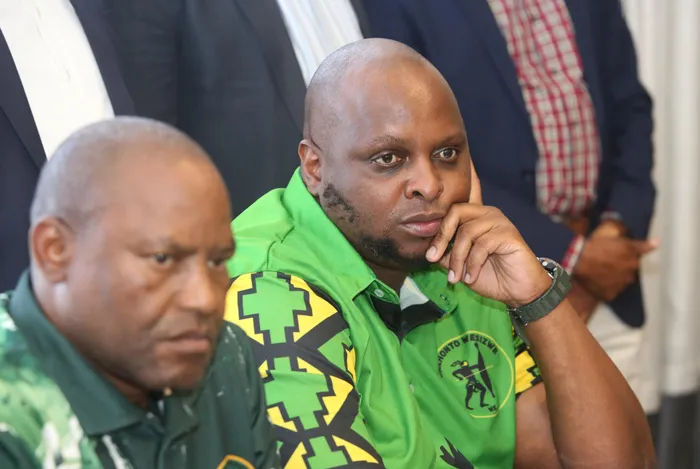Floyd Shivambu’s parliamentary snub: A political setback or a strategic reset?
Shivambu’s trajectory has taken a sharp and surprising turn
Floyd Shivambu, one of South Africa’s most recognisable and contentious political figures, is facing what may be the most significant crossroads of his career. His unexpected omission from the uMkhonto weSizwe Party’s (MKP) final parliamentary list has sent shockwaves through South Africa’s political corridors sparking questions about his future, the party’s internal cohesion, and the broader state of opposition politics in the country.

Floyd Shivambu was dismissed as the secretary-general of the MK Party early this month.
Image: Tumi Pakkies / Independent Newspapers
Once considered the intellectual backbone of the Economic Freedom Fighters (EFF) and a rising star in Parliament, Shivambu’s trajectory has taken a sharp and surprising turn. Shivambu’s journey from the red overalls of the EFF to the gold-and-black insignia of the MKP was nothing short of dramatic. After serving as Deputy President and Parliamentary Chief Whip of the EFF, his departure to the newly launched MKP was viewed as a calculated move one that could position him at the heart of a promising political force led by former President Jacob Zuma.
Within months, Shivambu had secured two senior leadership positions in the MKP: first as national organiser and later as secretary-general. His rapid ascent within party ranks seemed to confirm his enduring political relevance. But politics is nothing if not unpredictable. When the MKP’s final parliamentary list was released, Shivambu’s name was nowhere to be found.
Insiders suggest Shivambu’s exclusion reflects deeper tensions within the MKP. His omission coincides with a broader leadership shuffle and recent comments by Zuma alluding to disciplinary actions against unnamed party figures. While initial speculation pointed to a possible redeployment to Parliament, the absence of his name from the final list indicates a more serious rupture.
Zuma’s public stance asserting his readiness to act against those who deviate from party principles has been interpreted by many as a move to consolidate authority. In this context, Shivambu’s sidelining could be read as a casualty of internal political warfare rather than a mere bureaucratic oversight.
For a seasoned debater and policy tactician like Shivambu, losing a parliamentary seat is more than a logistical inconvenience; it is a loss of political capital. Parliament offers visibility, influence, and a legitimate platform to shape national discourse. Deprived of this arena, Shivambu’s influence risks diminishing rapidly.
There are four immediate implications for his political standing:
- Loss of Legislative Power
- Diminished Authority Within the MKP
- Strategic Uncertainty
- Reputational Blow
Shivambu’s plight is symptomatic of the volatility that characterises much of South Africa’s opposition politics. New formations like the MKP may emerge quickly, but sustaining unity, discipline, and strategic direction is another matter altogether. The MKP’s internal instability, exposed through high-profile rifts such as this one, undermines its ability to present a credible alternative to the ruling African National Congress (ANC). Moreover, Zuma’s centralised leadership style while effective in mobilising loyalty risks alienating independent thinkers and sidelining key figures like Shivambu.
This moment also speaks to a broader truth: South Africa’s opposition parties often struggle with succession planning, talent retention, and internal democracy. Shivambu’s exit from the EFF, and now his uneasy relationship with the MKP, raises uncomfortable questions about how parties manage dissent and ambition. Shivambu may be down, but he is unlikely to remain silent. Known for his sharp intellect and robust public engagement, he could yet reinvent himself outside Parliament through media, policy advocacy, or party organisational work.
However, regaining political momentum will not be easy. The damage to his credibility, especially following two high-profile political breakups in a short space of time, may take years to repair if at all. Still, in the ever-shifting terrain of South African politics, nothing is permanent. Shivambu’s story is far from over. Whether this moment marks the beginning of a political renaissance or a long fade into obscurity depends as much on his next moves as it does on the evolving calculus within the MKP and beyond.
Nyaniso Qwesha holds an MBA and is a keen observer and commentator on current affairs.
Related Topics: